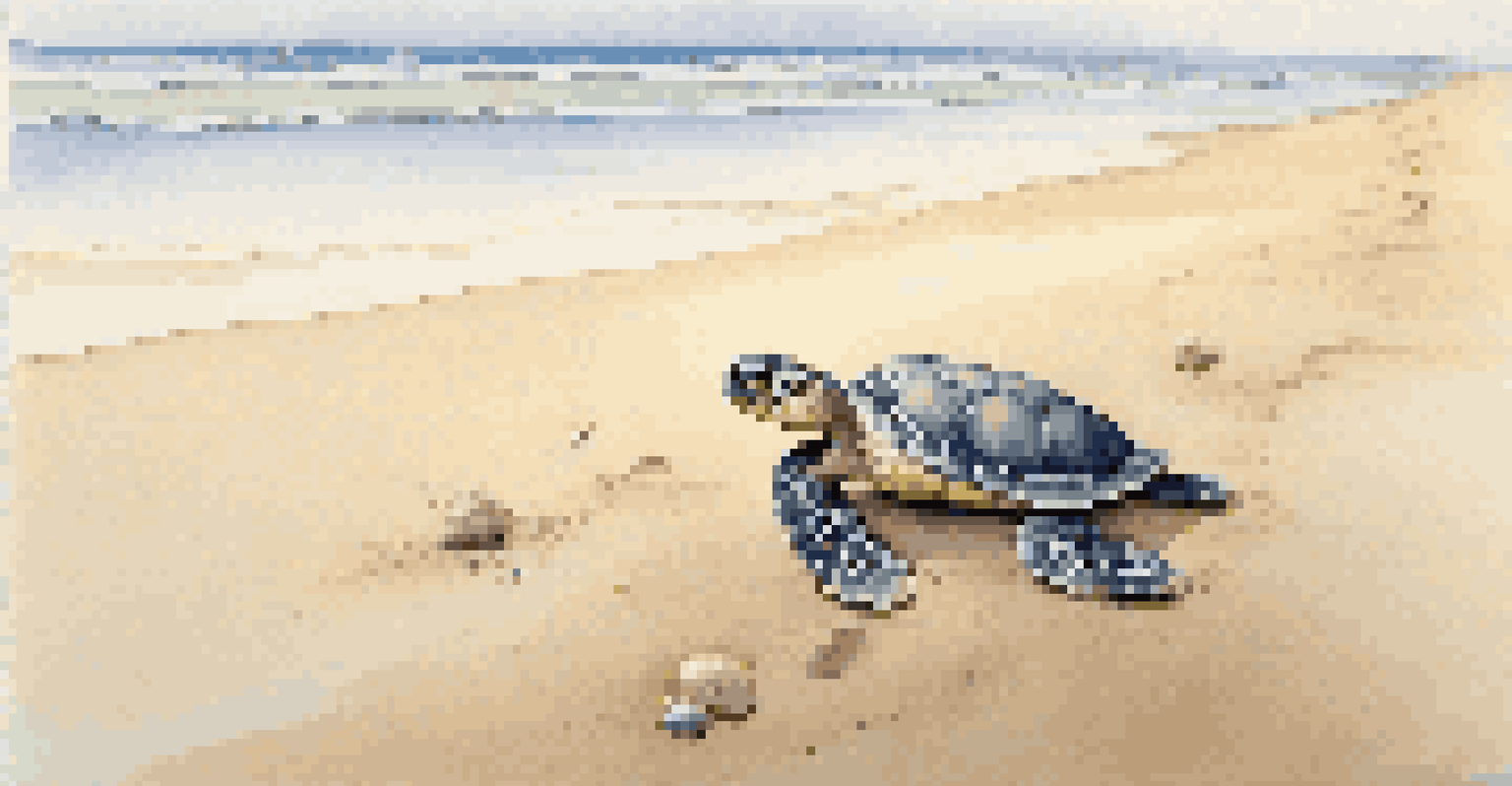Traveling for Conservation: Engage with Local Wildlife Efforts

Understanding the Importance of Wildlife Conservation
Wildlife conservation aims to protect animal species and their habitats, ensuring biodiversity thrives. This is crucial not only for the planet but also for human wellbeing, as ecosystems provide essential services like clean air and water. By understanding the delicate balance of nature, we can appreciate the role each species plays, from pollinators to apex predators.
In every walk with nature one receives far more than he seeks.
Engaging with conservation efforts during your travels can deepen your appreciation for these initiatives. Imagine witnessing a sea turtle hatchling making its way to the ocean, a moment that highlights the urgency of protecting such species. This connection can inspire you to contribute meaningfully to conservation, both locally and globally.
Moreover, as travelers, we have a unique opportunity to influence local economies positively. Eco-tourism can provide the funding necessary for wildlife protection, creating jobs that rely on preserving natural habitats instead of exploiting them. This shifts the narrative from destruction to preservation, making conservation economically viable.
How to Choose Wildlife-Friendly Destinations
When planning your trip, look for destinations that prioritize conservation efforts. Research places that have established eco-friendly practices, like wildlife reserves or national parks. These locations often have programs in place that protect local wildlife while offering visitors a chance to experience nature responsibly.

Consider participating in tours that are run by local conservation groups. These tours often provide educational insights into the wildlife and habitat, ensuring your visit supports their preservation efforts. For example, a guided safari in a conservation area often includes a portion of your fee that goes directly to protecting the animals you see.
Wildlife Conservation Benefits All
Protecting animal species and their habitats is vital for biodiversity and human well-being, as ecosystems provide essential services.
Additionally, choose accommodations that are committed to sustainability. Many lodges and hotels now implement eco-friendly practices, such as using solar energy, minimizing waste, and supporting local communities. Staying at these places not only enhances your travel experience but also aligns your values with your actions.
Engaging with Local Conservation Projects
Once you arrive at your destination, seek out local conservation projects you can support. Many organizations welcome volunteers, offering opportunities to assist with wildlife monitoring, habitat restoration, or education programs. This hands-on experience can be incredibly rewarding and provides a deeper understanding of the challenges faced by local wildlife.
The environment is where we all meet; where we all have a mutual interest; it is the one thing all of us share.
For instance, participating in a beach clean-up can significantly impact local marine life. By removing debris from nesting areas, you help ensure that sea turtles have a safe space to lay their eggs. This kind of engagement allows you to make a tangible difference while exploring the area's natural beauty.
Moreover, engaging with these projects often leads to meaningful connections with local communities. You'll meet individuals who passionately work to protect their environment, and you might even forge friendships that last beyond your trip. These interactions enrich your travel experience, making it more than just sightseeing.
Respecting Wildlife and Natural Habitats
As travelers, it's essential to respect wildlife and their habitats. This means observing animals from a distance and avoiding activities that could disturb their natural behavior. For instance, never feed wild animals, as this can lead to dependency on humans and disrupt local ecosystems.
Additionally, stick to marked trails during hikes to minimize your impact on sensitive habitats. Straying off the path can damage plant life and disturb the homes of various species. By practicing responsible travel habits, you help preserve the environments you enjoy and ensure they remain beautiful for future visitors.
Choose Eco-Friendly Travel Options
Selecting destinations and accommodations that prioritize conservation can enhance your travel experience while supporting wildlife protection.
Remember, your actions can set an example for others. Share your experiences and educate fellow travelers about the importance of respecting wildlife. By creating a culture of conservation among travelers, we collectively contribute to the protection of our planet.
The Role of Eco-Tourism in Conservation
Eco-tourism plays a significant role in wildlife conservation by promoting responsible travel practices. It focuses on experiencing natural areas while conserving the environment and improving the well-being of local communities. This sustainable approach benefits both travelers and destinations, creating a win-win situation.
When you choose eco-tourism options, you help create funding for conservation efforts. Entrance fees to national parks, for example, often go directly into protecting the wildlife and habitats within them. This means that by enjoying the beauty of nature, you're also playing a part in its preservation.
Moreover, eco-tourism encourages local communities to engage in conservation. When communities benefit financially from preserving their environment, they are more likely to protect it. This creates a cycle of sustainability, where tourism supports conservation, and conservation enhances tourism.
Sharing Your Experience: Advocacy Through Travel
Your travel experiences can be powerful tools for advocacy. By sharing stories and photos on social media or blogs, you raise awareness about wildlife conservation issues. Highlighting local projects you encountered can inspire others to travel responsibly and support similar efforts.
For example, if you participated in a community-led conservation initiative, share what you learned and how others can get involved. Your insights can motivate friends and family to think twice about how they travel and the impact they have on the environment.
Engage Locally for Greater Impact
Participating in local conservation projects during your travels allows you to make a tangible difference and connect with communities.
Furthermore, consider supporting organizations that advocate for wildlife conservation once you return home. Donations or spreading the word about their work can amplify their efforts. Remember, every small action counts, and collectively, we can make a significant difference.
The Future of Travel and Conservation
As awareness of environmental issues grows, the future of travel is shifting toward more sustainable practices. Travelers are increasingly seeking experiences that align with their values, prioritizing conservation alongside adventure. This shift is paving the way for a new era of eco-conscious tourism.
Innovative solutions, like virtual reality wildlife experiences, are also emerging, allowing people to engage with nature without leaving their homes. As technology advances, it can complement traditional travel, providing education and inspiration for future trips focused on conservation.

Ultimately, the fusion of travel and conservation presents an exciting opportunity for everyone. By prioritizing wildlife protection in our travels, we can contribute to a healthier planet. The next time you plan a trip, think about how you can engage with local wildlife efforts and make a lasting impact.